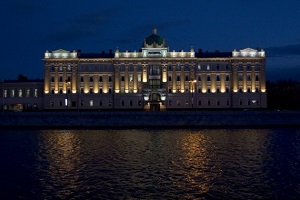Rosneft Reserve Replacement Ratio Nears 180%, Hydrocarbon Resources Reach 339 billion BOE

Rosneft reviewed the results of DeGolyer & MacNaughton's independent audit of its hydrocarbon reserves. In 2013, Rosneft once again confirmed its positions as a world’s leader among publicly traded companies in terms of proven hydrocarbon reserves and hydrocarbon resources.
Rosneft hydrocarbon reserves as of December 31, 2013:
| Liquids, mln bbl | Gas, bcf | Hydrocarbons*, mln BOE | ||||
|---|---|---|---|---|---|---|
| 2012 | 2013 | 2012 | 2013 | 2012 | 2013 | |
| SEC Classification (U.S. Securities and Exchange Commission) | ||||||
| Proven Reserves (1P) | 23,544 | 25,191 | 36,334 | 46,941 | 29,599 | 33,014 |
| PRMS Classification (Petroleum Resources Management System) | ||||||
| Proven Reserves (1Р) | 30,270 | 30,782 | 52,900 | 65,937 | 39,087 | 41,771 |
| Proven + Probable Reserves (2Р) | 51,591 | 54,002 | 84,125 | 108,661 | 65,612 | 72,113 |
| Proven + Probable + Possible Reserves (3Р) | 73,079 | 77,118 | 114,188 | 142,652 | 92,110 | 100,893 |
* 1 barrel of oil equivalent (BOE) is equal to 6,000 cubic feet of gas. Rosneft's total reserves include 100% of reserves held by consolidated subsidiaries as well as Rosneft's share in reserves held by affiliates.
According to the results of the audit performed by DeGolyer & MacNaughton under the SEC life-of-field classification, as of December 31, 2013, Rosneft proven hydrocarbon reserves stood at 33,014 million BOE. That includes liquid hydrocarbon reserves (oil, condensate, NGL) of 25,191 million bbl (3,398 million tonnes) and gas reserves of 46,941 billion cubic feet (1,329 billion cubic meters). Тherefore, these figures put 2013 Rosneft's reserve replacement ratio at 179%. The Company’s hydrocarbon reserves grew by 11% (liquid hydrocarbon reserves grew by 6% and gas reserves grew by 29%) compared to the level registered at the end of 2012. Reserves growth was achieved primarily due to the delivery of the geological exploration program, drilling and bringing into development new sections of the Company's key fields, wellwork performed to maintain base production, and due to increase of stakes in OOO Taas-Yuryakh Neftegazodobycha and Itera Oil and Gas Company.
DeGolyer & MacNaughton also audited Rosneft's hydrocarbon reserves under PRMS classification. Proven hydrocarbon reserves (1P) as of December 31, 2013 stood at 41,771 million BOE, including 30,782 million bbl (4,161 million tonnes) of liquids (oil, condensate, NGL) and 65,937 billion cubic feet (1,867 billion cubic meters) of gas. As of the end of 2013, Rosneft's reserve life was 24 years; 20 years for oil and 50 for gas.
The volume of proven reserves is, to a large extent, based on the results of the existing fields’ development, including their geological and technological potential. At the same time, the Company is working actively to commission in 2016 – 2019 the new large fields in East and West Siberia, including Suzun, Tagul, Lodochnoe, Yurubcheno-Tokhomskoye, Russkoe, and Kynsko-Chaselskaya group of fields. In addition, implementation of new technologies, such as drilling the wells with long horizontal sections with multiple stage hydraulic fracturing, will allow bringing significant volumes of oil reserves into development in the midterm, including hard-to-recover reserves (shale oil). Therefore, probable reserves amounting to over 70% of proven hydrocarbon reserves will be brought into development.
Rosneft Prospective Resources as of December 31, 2013:
| Liquids, mln bbl | Gas, bcf | Hydrocarbons*, mln BOE | ||||
|---|---|---|---|---|---|---|
| 2012 | 2013 | 2012 | 2013 | 2012 | 2013 | |
| Prospective Resources | 112,499 | 193,196 | 529,411 | 872,576 | 200,734 | 338,625 |
* 1 barrel of oil equivalent (BOE) is equal to 6,000 cubic feet of gas. Rosneft's total reserves include 100% of reserves held by consolidated subsidiaries as well as Rosneft's share in reserves held by affiliates
Furthermore, DeGolyer & MacNaughton audited Rosneft's resources. As of December 31, 2013, the mean estimate of prospective recoverable hydrocarbon resources of the Company was 339 billion BOE (46 billion TOE), almost 70% more than at the end of 2012. The growth was primarily due to the exploration activities performed in the Company's acreage in the Kara Sea, Laptev Sea, the Black Sea, and due to obtaining in 2013 licenses for the new offshore blocks in the Barents Sea, Pechora Sea, Kara Sea, Chukchi Sea and the Laptev Sea.
Commenting on the audit results, Rosneft President Igor Sechin said, "The results of the audit once again showed high professional performance of our specialists and efficient use of state-of-the-art technologies in exploration and production. During the past 5 years, the Company has been steadily replacing over 100% of its production by adding new reserves. Resource base growth is one of the key elements of increasing shareholder value of an oil company".
Rosneft Information Division
Tel.: +7 (499) 517 88 97
www.rosneft.com
January 21, 2014
These materials contain statements about future events and expectations that are forward-looking in nature. Any statement in these materials that is not a statement of historical fact is a forward-looking statement that involves known and unknown risks, uncertainties and other factors which may cause actual results, performance or achievements expressed or implied by such forward-looking statements to differ. We assume no obligations to update the forward-looking statements contained herein to reflect actual results, changes in assumptions or changes in factors affecting these